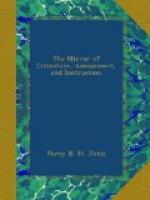and childish frolics, soon formed acquaintance with the hostess’s daughter,
the little Louise. For some time previous to the arrival of the diligence
at the auberge, a storm had been expected; and the distant thunder and
heavy drops of rain beating against the casements before the dinner was
half over, gave appearance of justice and reason to the entertainment of
such anticipations, and caused a general congratulation at the party being
so safely housed. As the storm was increasing every minute, much argument
was not necessary to induce the postilion to delay proceeding until it
might abate. Some of the party adhered to the bottle, some resorted to a
book, and some to cards, to wile away the time. The lady requested to be
conducted to a private apartment, wherein to pass with her dear child
(remote from the noisy mirth of her companions, so little according with
her then feelings) the time, until the diligence might again be ready to
start. But half an hour had scarce elapsed from the formation of this
arrangement ere admission was sought and gained by a brigade of English
soldiers, six of whom, on a support formed by muskets, bore what seemed to
be the corpse of an officer, whose arm, hanging down, gave to another
officer the hand. Such a scene soon attracted general attention. In a few
minutes a couch, by the junction of two or three chairs, was made, and on
that the body laid. The soldiers who had formed the support, with arms
grounded and grief deeply marked on their countenances, presented a
melancholy group; whilst the young officer, kneeling by the couch, and
gazing intently on his friend, but served to heighten the melancholy of the
scene. A long silence of anxiety, interrupted but by the rolling of the
thunder and the pattering of the rain, ensued. “’Tis no use,” at length
exclaimed the friend of the wounded man, “’tis now no use even to hope, my
brave fellows; the surgeon was deceived, and rash to consent to his
removal. Your commander has sunk beneath the fatigue. I thought it would be
so. Peace,” he exclaimed, as the tears fell fast from his eyes, “peace to
thy manes, brave, generous St. Clair.” An agonizing shriek from above
startled all; and in another moment the lady (the traveller in the
diligence) fell on what appeared to be the soldier’s bier. “Heavens! what
dream is this?” exclaimed the officer who had been so assiduous in his
attention to the unfortunate man; “my sister here!—let me intreat, let me
beg—” “No, Albert Fitzalleyn—no, brother, no,” uttered Mrs. St. Clair,
“remove me not—I am calm, resigned, very, very calm—I expected this—if I
cannot live I can die with him. St. Clair, awake—your wife, your Charlotte
calls—what not one smile?—look here,” she cried, pulling the frightened,
trembling, weeping child towards the body, “your child, your boy, your
dearest Edward calls for you too. O, agony! he does not move. Dead! no, no,
it cannot be—my life, my love, my husband.” And there was something, it




